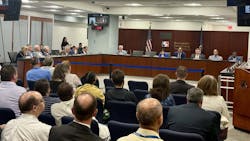SEPTA Board votes to initiate transfer of $394 in capital assistance funds
The Southeastern Pennsylvania Transportation Authority (SEPTA) Board voted to transfer $394 million of federal, state and local capital funds to the operating budget, amending the fiscal year (FY) 2026 Capital Budget and FY26 Program of Projects with the requested funds.
The Pennsylvania Department of Transportation (PennDOT) approved the emergency request last month to assist SEPTA in preserving service and avoiding possible service cuts for the next two years. The agency notes that transferring capital funds to support operations requires capital project offsets. As a result, SEPTA will defer some of its projects, including new bus procurement, the Bristol Regional Rail Station accessibility project and the construction at the Frazer Railroad Facility.
Pennsylvania Gov. Josh Shapiro has shown support for funding SEPTA over the last two years, first suggesting an increase in funding for the system in the amount of $292 million in the 2025-26 proposed budget, a figure that would mature into $1.5 billion over the next five years. That funding call came after the administration secured $80 million in further transit funding from the 2024-25 bipartisan budget and another $153 million in federal highway funds, money that kept SEPTA from impending service disruptions and a 21% fare increase.
“The board supports these project deferrals because they do not compromise safety by stopping crucial repairs,” said SEPTA Board Chair Kenneth Lawrence Jr. “We also do not want to disrupt projects that are already underway, including the replacement of the Market-Frankford Line [L] and trolley cars.”
Under this amendment, SEPTA will postpone.
- The purchase of 247 new hybrid diesel-electric buses by three years ($256 million).
- The project designed to bring Bristol Station on the Trenton Line into compliance with the Americans with Disabilities Act ($46 million).
- The final phase of an expansion to the Frazer Railroad Facility ($39 million).
- The purchase of hydrogen and electric-powered buses for SEPTA’s zero-emissions pilot program ($41 million).
- The retrofitting of existing hybrid buses to run exclusively on electric power ($11 million).
These deferred initiatives are in addition to 44 planned infrastructure projects the agency had previously paused to save $1.8 billion budgetary dollars to address a gap between the project costs and funding available in the original FY26 Capital Budget.
“Using capital funds for operations keeps us moving today, but it pushes those critical investments further down the road,” said SEPTA General Manager Scott Sauer. “We stand ready to continue working with leaders in Harrisburg to develop a long-term solution that addresses both our operating needs and the capital investment so critical to our future.”
Capital funds are expected to be available in January 2026.
